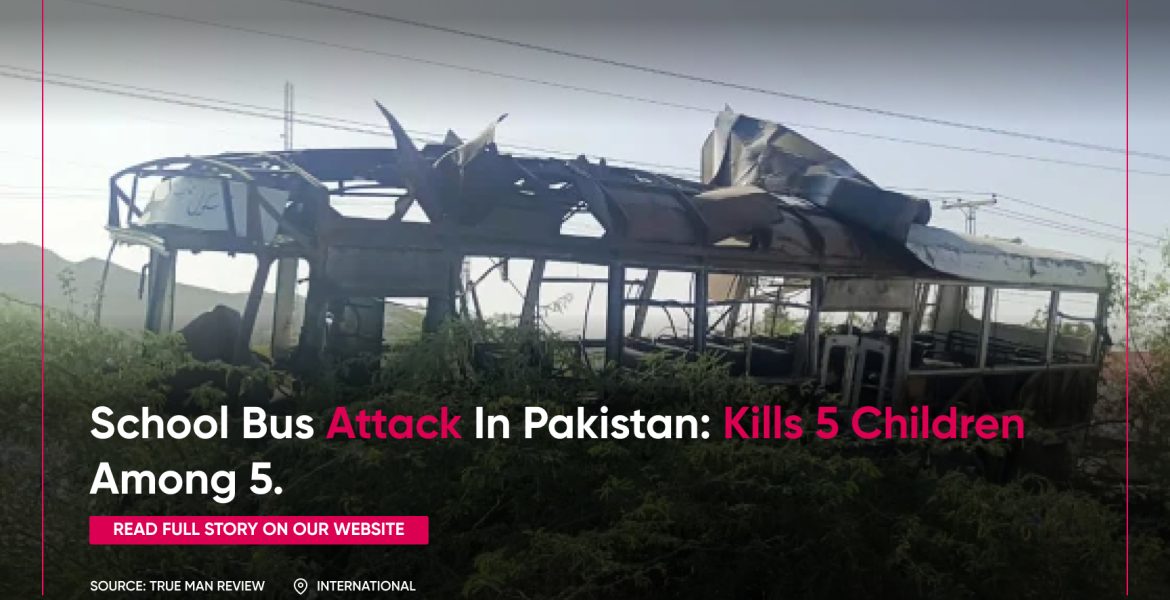School Bus Attack in Pakistan: Khuzdar, Balochistan Bomb Attack on School Bus in Balochistan Kills Five, Injures Dozens. In a tragic reminder of the fragile security situation in Pakistan’s southwestern province of Balochistan, a bomb attack targeted a school bus near the remote town of Khuzdar on Wednesday morning, killing at least five people, including three school children, and injuring at least 38 others.
The explosion occurred around 07:40 local time (02:40 GMT), as the bus was transporting approximately 40 children, most of whom were students of a military-run Army Public School. Authorities described the blast as a suicide attack, although no group has yet claimed responsibility.
Images from the aftermath circulated widely on social media, depicting the charred shell of the bus and school bags scattered across the blood-stained road—heart-wrenching symbols of another act of senseless violence in a region long plagued by insurgency and political instability.
A Targeted Strike on the Nation’s Future
According to senior provincial official Yasir Dashti, the victims were primarily children of military personnel attending one of the country’s many Army Public Schools—institutions specifically designed to serve the families of Pakistan’s armed forces.
“The bus was carrying Army Public School children,” confirmed Kaleem Ullah, a local police officer. “This was not just an act of terror—it was a direct attack on the future of Pakistan.”
The Pakistani military released a statement confirming the deaths of three children and two adults, condemning the attack in the strongest possible terms.
Interior Minister Mohsin Naqvi described the bombing as “sheer barbarism,” calling the perpetrators “beasts who target children to destabilize our country.”
Balochistan: A Region in Crisis
Balochistan, Pakistan’s largest but most sparsely populated province, has long been the epicenter of a simmering separatist insurgency. The mineral-rich province, which borders both Iran and Afghanistan, has seen decades of conflict driven by demands for political autonomy and control over local resources.
In recent years, militant violence has surged in the region, often targeting infrastructure, military assets, and civilians. The Balochistan Liberation Army (BLA), a separatist group designated as a terrorist organization by Pakistan, the United States, and the United Kingdom, has claimed responsibility for several high-profile attacks. However, no group has claimed responsibility for Wednesday’s bombing.
Just two months ago, the BLA was behind a deadly hijacking of a passenger train in the Sibi district, where 27 people were killed and hundreds held hostage in a violent siege that shocked the nation.
Geopolitical Fallout: Pakistan Blames India
In the immediate aftermath of the Khuzdar attack, Pakistan’s military pointed fingers at India, accusing it of operating “proxies” to orchestrate destabilising acts within Pakistani territory, particularly in Balochistan.
“Indian proxies are behind this attack,” a military spokesperson alleged, although no evidence was provided to support the claim.
Prime Minister Shehbaz Sharif echoed the accusation, referring to the bombing as a “cowardly attack orchestrated by enemies of the state” and vowing that “those who spill the blood of our children will be brought to justice.”
India’s Ministry of External Affairs swiftly responded, rejecting the allegations as “baseless” and accusing Pakistan of deflecting blame from its own internal failings.
“India condoles the loss of lives in all such incidents,” an Indian government spokesperson stated. “However, it has become second nature for Pakistan to blame India for all its internal issues.”
Tensions between the nuclear-armed neighbors remain high following a recent deadly assault on tourists in Indian-administered Kashmir. That attack triggered a brief four-day conflict earlier this month—the most significant military escalation between the two countries in recent decades. Though a ceasefire has been in place since, mutual mistrust continues to define bilateral relations.
Children: Victims of a Deepening Crisis
The targeting of children has tragically become a recurring element in Pakistan’s violent history. From the 2014 massacre at the Army Public School in Peshawar, where 145 people, mostly children, were killed by Pakistani Taliban militants, to the 2012 assassination attempt on Nobel Laureate Malala Yousafzai, Pakistan’s youth have often been on the frontlines of terror.
Wednesday’s bombing reinforces the vulnerability of innocent civilians—especially children—in a region where decades of conflict have robbed communities of peace and progress.
Call for Justice and Unity
As Pakistan reels from yet another national tragedy, there are renewed calls for unity and a comprehensive strategy to end the cycle of violence in Balochistan. While geopolitical blame games dominate headlines, human rights groups and Baloch activists continue to highlight the need for reconciliation, political inclusion, and accountability.
For many, Wednesday’s attack is not just a security failure—it is a failure of politics, policy, and protection. The images from Khuzdar serve as a grim reminder that the cost of inaction is borne not in debates or statements, but in the lives of the youngest and most innocent.
The government has announced a day of mourning across Balochistan. Schools will remain closed, and prayers will be held for the victims.
As investigations continue, the families of those killed will bury their children—another generation lost in a conflict that has claimed far too many.


